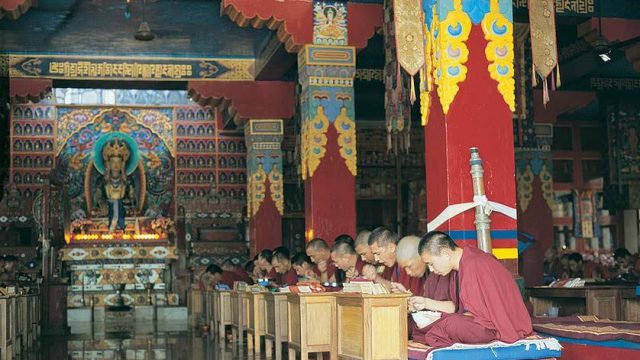The Himachal Tourism pamphlet about Solan district mentioned the Dolanji Bon Monastery near Ochhghat. To me, it was a familiar road, the one from Solan to Rajgarh, but I had never strayed the five kilometres from Ochhghat to the monastery in the three years that I went up and down it.
Then, while planning a trip home from Mumbai, I googled Dolanji Bon and learnt that it wasn’t just any monastery: it was the headquarters-in-exile of Tibet’s oldest religion, Bon, and home to the faith’s spiritual chief, His Holiness the 33rd Menri Trizin, Lungtok Tenpai Nyima.
So, on a hot May morning, I set out to visit the monastery and better acquaint myself with Bon. The turn for Kotla Panjola village came up a few kilometres before the river and five minutes later I saw the unmistakable yellow canopy of a Tibetan temple. In the drab summer landscape of Solan, the bright temple was a cheerful sight, but it disappeared almost as soon as I saw it. When I finally rode into the Tibetan settlement at Kotla Panjola, all I found were a few shops and curious eyes looking down from the walls above. Only the old confectioner understood Hindi, and he sent me up the hillside with a boy for a guide.
It was easy going after that, as I ran into the seemingly stern Dr T.G. Negi, a ‘Geshe’ or scholar of Bon scriptures and traditions. He was all for my having lunch first, but I persuaded him to let me into the Bon temple that stood just across the square ground.
The temple was empty at that hour, thangka paintings hung from the ceiling and circled the pillars while an idol of Tonpa Shenrab, the founder of Bon, glowed in the light of colourful bulbs above the altar. The offerings at the altar ranged from fruit to incense to glucose biscuits and Cadbury chocolates.
Monks had started trickling into the hall and settling down at their desks. It was their lunch hour, after which they would chant and perform their daily rituals. Dr Negi and I moved out to the ground, from where he pointed out the living quarters of the monks and the children’s dormitory. A small but beautiful building on the temple’s left was the Menri Trizin’s home, he said, and we had a glimpse of His Holiness when he stepped out to see off a visitor.
Over lunch, Dr Negi and I discussed Bon: how it differed from Buddhism, its tenets, the Menri Trizin, and so on. “Bon,” he said, “is a religion much older than Buddhism that Tonpa Shenrab founded in a land called Olmo Lungring, somewhere to the west of present-day Tibet.” How long ago, I asked him, expecting a figure between 2,500 and 3,000 years ago, but his answer — 18,021 years — left me speechless. It was too precise a number for me to dispute.
Bon preaches a high regard for nature, and not surprisingly, non-violence is one of the key elements of the faith. Following the Menri Trizin’s example, the Bonpos are also expected to be vegetarian. They must not lie or steal, and should lead a simple life. At the monastery, a typical meal is spartan, comprising of roasted barley with milk and cheese.
Just as Bon influenced Buddhism in Tibet, so it was influenced by the latter. “Bon was a simple philosophy, with no concept of monastic life until it came under Buddhist influence,” says Dr Negi. But the Bonpos have retained many of their older practices. For instance, they still divide the year into 360 days, with the first month reserved for celebration.
Talk finally veered round to the word Menri. “It was the pre-eminent Bon monastery founded by Nyame Sherab Gyaltsen in the Tsang province of Tibet, in 1405 AD,” explained Dr Negi. While the original monastery was destroyed during the Cultural Revolution, His Holiness, who was then teaching Tibetan history and religion in Oslo as an exile, was chosen successor to the 32nd abbot of Menri in 1966. In 1969, he began work on re-establishing the Menri monastery in exile, in Solan, at a site where a camp for Tibetan Bonpos had come up a few years ago.
In the three-and-a-half decades since, the Menri monastery at Kotla Panjola has thrived. It’s not just the pretty buildings but also the smiles on the faces of the Bonpos that attest to the Menri Trizin’s success.
The Dolanji Bon Monastery is located in the Solan district of Himachal Pradesh. From Solan city (70km from Chandigarh) take the Rajgarh road to Ochhghat.




